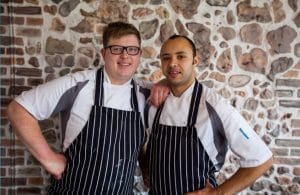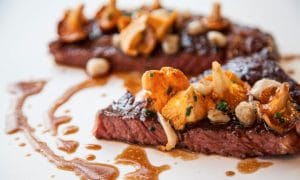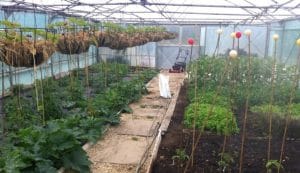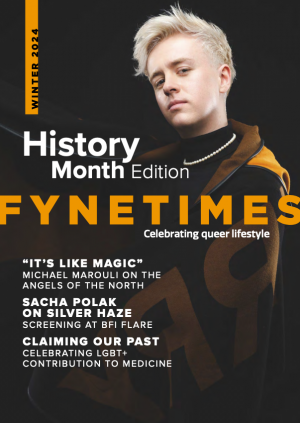O xfordshire is undoubtedly blessed with a wealth of excellent chefs, but few have the kind of fierce passion and sheer artistry that Ryan and Liam Simpson-Trotman have. As the proprietors of one of Oxfordshire’s best restaurants, Orwells – near Shiplake – the pair have won numerous accolades including four AA rosettes, and in our opinion, cook up some of the most exciting cuisine in the area.
Here, the duo speak to Jack Rayner about lambs’ hearts, beekeeping and staying ahead of the curve…
 How did you get into cooking, and how did you end up making such a formidable team?
How did you get into cooking, and how did you end up making such a formidable team?
Ryan: I’ve been into cooking all my life, but my parents put me off it because I was quite good at art and secured an apprenticeship with Jaguar to do concept car design. They went off on holiday to Ibiza, and I just thought “I can’t do this, I really want to be a chef”. I went and enrolled at the local college whilst my parents were on holiday, went down with my nan, and by the time they came back I was a fully-fledged apprentice chef. I started off right at the bottom, at a Beefeater, then worked at some of the best restaurants in France for five years. I worked in London for a bit then moved down to Torquay, which is where Liam and I met.
Liam: I was cooking three-course meals for my family from the age of about 13 or 14. My dad was a fruit and veg guy, so we always had fresh produce, and my mum worked nights so I took over the cooking, which was quite nice. My grandma would always be cooking something in her kitchen –she’d get whole legs of lamb, pigs’ heads, fish that we had to scale and gut ourselves, and so on. From college, I went to work in a few places around Liverpool, including the famous 60 Hope Street, before working for Peter de Savary at Bovey Castle, in Dartmoor, which is when I met Ryan.
At what point did the pair of you realise that it was time to open up your own place?
Ryan: After we met in Torquay, we started dating. I got offered a job at Winteringham Fields, and I asked Liam to come with me. We headed up the kitchen there when Robert Thompson was leaving, but quickly decided that it was time for us to leave because I don’t think we were quite ready to be running somewhere like that at that time. At that point I was up for running a smaller establishment in the countryside. We were offered The Goose in Britwell Salome – which had been a Michelin starred place – and within 18 months we’d won back the star.
 What did you see in what is now Orwells which made you think “Yep, that’s our place”?
What did you see in what is now Orwells which made you think “Yep, that’s our place”?
Ryan: We had our famous walkout at The Goose, taking all of our staff with us, then Liam and I were pretty much jobless and on the dole. We were kind of ‘hot cakes’ because we’d just won a Michelin star, so we had a lot of interest around us, but the goal was always to have our own business. About two weeks before we were going to sign for a different property, Brakspear contacted us about the place which is now Orwells. We didn’t know the area, so we went to check it out. I went in and sat at the bar, and there was this crazy Dutch lady running the show. I was the only one in there at lunchtime on a Saturday, and she was trying to put me off. Liam came over and we had a couple of pints to work out what the trade was like – we ended up still being the only ones there, on a Saturday night. By this point I was thinking “Oh my god”… We asked if they did Sunday lunch, and the lady said “No. I am Dutch and I don’t do Sunday lunch”. The cooking was terrible. I heard stories that you’d order a chateaubriand or something, and you’d hear her shouting and banging in the kitchen, and two hours later she’d rock up with this overcooked piece of beef. It was a risk, but we put a business plan together, raised about £15,000, and negotiated some great terms with Brakspear.
Liam, I understand that you’re a beekeeper now?
Liam: Yeah, it’s quite nice to have another string to the bow. We do our own vegetables, as you know, but the bees are an exciting element because we don’t just use the honey in our cooking – we use it in cocktails as well. We do our famous honey sponge, and use it in about six or seven cocktails at the moment. We haven’t bought honey in five years.
What else makes Orwells stand out from the competition?
Liam: We don’t do anything different specifically, but what we do is believe in our view and cook food that we enjoy eating. Some chefs are quite afraid of putting out things that they like – I love lambs’ hearts, for instance. I grew up on them, I cooked Ryan braised lambs’ hearts two years ago, and now we have lambs’ hearts on the menu. It’s about being brave and bold, taking flavours that you had as a child then doing something more interesting with them – instead of braising it, at Orwells we sear it on the barbecue, slice it and serve it with other parts of the lamb, which is really great. That’s all that separates us: the flavours. Many times we’ve been to restaurants and it all looks good, but it’s missing something. When you’ve got the two owners of the business in the kitchen, 16 or 17 hours a day, we’re going to show nothing but love and passion for everything that we do.
 Ryan: I think that’s also a unique selling point – we’re both in the kitchen, all the time. The emphasis is very much nose-to-tail, and there’s no wastage at all. But like Liam said, it’s mostly about the injection of flavour. Our motto is ‘rural cooking with a modern approach’. We’ll use modern cooking techniques, but based around those rural flavours, and it seems to win people over. We’re not afraid to put a bit of offal here or there, or to use all cuts of the animal. We’ve always been dictated to by the seasons. Now, we go directly to farms, taking the cuts that we want, then we’ll dry-age the beef, for example, in our own cabinets, then work our way through that cut. So, on our menu, one month it might just say ‘Hereford’, or ‘Angus’, or ‘Dexter’, with no specific cut listed – it’s what we’re doing at the time. It’s a brilliant way of working. Another example is we’ll get half a wild boar in from the Forest of Dean, and just work our way through the boar. One day you might get some rump, another day you might get a cutlet. At some of the three Michelin star restaurants, that need consistency day in, day out, you see farmed halibut on the menu, or sea bream, which isn’t native to this country. Sea bream is usually reared in Cyprus or Turkey, and sent to the UK. In contrast, we go directly to the fishermen, and they tell us what they’ve got. At the moment we’re using something called Cornish blackjack, which you might not have heard of. It’s between sea bass and cod, and cooks amazingly.
Ryan: I think that’s also a unique selling point – we’re both in the kitchen, all the time. The emphasis is very much nose-to-tail, and there’s no wastage at all. But like Liam said, it’s mostly about the injection of flavour. Our motto is ‘rural cooking with a modern approach’. We’ll use modern cooking techniques, but based around those rural flavours, and it seems to win people over. We’re not afraid to put a bit of offal here or there, or to use all cuts of the animal. We’ve always been dictated to by the seasons. Now, we go directly to farms, taking the cuts that we want, then we’ll dry-age the beef, for example, in our own cabinets, then work our way through that cut. So, on our menu, one month it might just say ‘Hereford’, or ‘Angus’, or ‘Dexter’, with no specific cut listed – it’s what we’re doing at the time. It’s a brilliant way of working. Another example is we’ll get half a wild boar in from the Forest of Dean, and just work our way through the boar. One day you might get some rump, another day you might get a cutlet. At some of the three Michelin star restaurants, that need consistency day in, day out, you see farmed halibut on the menu, or sea bream, which isn’t native to this country. Sea bream is usually reared in Cyprus or Turkey, and sent to the UK. In contrast, we go directly to the fishermen, and they tell us what they’ve got. At the moment we’re using something called Cornish blackjack, which you might not have heard of. It’s between sea bass and cod, and cooks amazingly.
What dish are you most proud of that’s currently on the menu?
Ryan: The beef and charcoal is quite a cool one, and I love the oxtail dish that we do with squid.
How do you do the oxtail?
Ryan: It’s just very slow-braised, brought together with jus, then topped with seared squid and pickled and wet walnuts.
Glorious.
Liam: That’s a take on one of the dishes from when we were a pub; we used to do baby squid and stuff them with oxtail, so it’s gone from being a pubby dish to a more refined one, but with the same great flavours we’ve always done.
What’s your plan for the future?
Ryan: We’re going to develop the business, and then we’re going to have a family. We want to keep pushing this business – we’re developing all the wine menus at the moment, and infusing our own gins. The gin movement is massive, and I think we were right at the front of it in our area. We have a name round here for gins, but now everybody’s copying us, so now we want to set a new trend. When we started stocking 75 gins, no-one else around here had that kind of selection. Now everybody stocks loads of gin. We want to take it to another unique perspective, and the only way to do that is to continue to be at the forefront of innovations.
Liam: In January 2017 we spent five days in Champagne, and visited 19 growers, where the family own the land, they grow the grapes, and they produce the wine. We now have a lot of grower’s champagne on, which is much better than the high-end stuff. It’s the same ethos as Orwells: local, sustainable… it’s nice to have that personal contact with the people as well.
Ryan: We have very seasonal flavours in the gins as well; we’re infusing gins with certain flavours and making them our own. For example, at the moment we’re doing rhubarb gin, and we did an oyster leaf gin that is really salty and tastes like sea-spray, which we served with a caviar toast.







